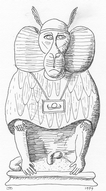
Phthoron Phthionê Thôuth.[2]
 Make from olive wood a small statue of a dog-faced baboon
with Hermes' winged hat on its head. There should be a box
in its back with a lid to close it. Write with myrrh ink on
papyrus the following name of Hermes:
Make from olive wood a small statue of a dog-faced baboon
with Hermes' winged hat on its head. There should be a box
in its back with a lid to close it. Write with myrrh ink on
papyrus the following name of Hermes:
You may add the following Great Names:
Phthoron Phthionê Thôuth.[2]
While you do so, pray for what you want. Put the papyrus in the statue and put on the lid. Burn incense before it and recite the following spell.
Iaô Sabaôth Adônaie[3]
Ablanathanalba[4]
Akrammakhamarei[5]
365Give Thou: business, favor, elegance, prosperity,
to [a certain one][6] and to his/her work.
Now! Now! Quickly! Quickly!
Nun! Nun! Êdê! Êdê!
Hear Thy names in Heaven:[8]
for these names are in the Quarters of the Heavens.
Lamphen Ouôthi : Ouasthen Ouôthi : Oamenôth : Enthomoukh
in the East Thou hast the figure of an Ibis;
in the West Thou hast the figure of a Dog-baboon;
in the North Thou hast the figure of a Snake;
in the South Thou hast the figure of a Wolf;
and I know Thy Plant: the Grape that is an Olive;
and I know Thy Wood, for it is Ebony.
Yes, I know Thee, Hermes, who Thou art and also
where You're from, which town: Hermopolis.
Come to me, Lord Hermes,
Many-named One, knowing secrets under Earth and
Sky.
Come to me, Lord Hermes, to [a certain one].
Kindly help me, benefactor of our world.
Hear me!
[Make me pleasing to all forms throughout the world;
open for me hands of all who may grant gifts;
make them give me what they're holding in their
hands.][10]
Yes, I know Thee and Thy Names Barbarian:
For these are Thy Names Barbarian!
Pharnathar : Barakhêl : Khtha.
And whenever Isis, Greatest of the Gods,
hath invoked Thee, Yea! in every crisis,
and in every place, 'gainst people, Gods and
daimons,
and what lives beneath the sea and on the
land,
She hath held Thy favor and had victory
over Gods and men with every creature in the
world.
Therefore also I, [a certain one], invoke Thee!
For[11] this reason, give me beauty, form and grace.
Hear me, Hermes, Helper, who invented drugs;
be Thou easy to converse with and attend;
Thou hast done all things shaped like Thine Ethiopian
dog-baboon, the Lord of Daimons Underground.
Calm them all and give me strength.
Make [add the usual][12]
[Let them give me gold, silver, endless sustenance.
Save me always and through all eternity --
from deceits, all slander, poisons, evil tongues;
from possession, hatred of both Gods and men.
Let them give me favor, victory and wealth.][10]
Inasmuch as Thou art I, and I am Thou,
and because Thy name is mine, and mine is Thine,
and because of this: I am Thine effigy.
If perhaps some evil should occur for me,
any time this year or month or day or hour,
it will happen to the Great God
 (Akhkhemen Estroph);
(Akhkhemen Estroph);
thus the prow of the most holy ship is carved.
Thy True Name is graven on the Sacred Stêlê,
set up in the Shrine at Thy birth-place Hermopolis.
Thy True Name:
 (Osergariakh Nomaphi),[13]
(Osergariakh Nomaphi),[13]
for this is Thy name of fifteen characters,
and the number of the days the Moon doth rise;
and Thy second name doth have the number seven,
corresponding to the Ones who Rule the World.[14]
Truly:
 (Abrasax).[15]
(Abrasax).[15]
Yes, I know Thee, Hermes, and Thou knowest
me;
I am Thou and Thou art I.
Therefore, do Thou everything for me I ask;
with Good Fortune and Good Daimon turn to me.
Now! Now! Quickly! Quickly!

Nun! Nun! Êdê! Êdê!
 .
I will leave corrections to the reader.
.
I will leave corrections to the reader.
 (Abrasax)
is 365.
(Abrasax)
is 365.
 Send comments about this page
Send comments about this page